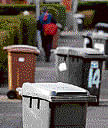

A pro-privacy group warns in a new report that more than 2.6 million of the chips have been surreptitiously installed in what is seen as a first step toward charging those who toss too much.
Proponents say it’s a bid to push recycling. Opponents say it stinks. “They should mind their own business,” said Terry Williams, an unemployed Londoner who thinks the government is meddling. “I believe they have gone too far. It’s not like we are throwing away anything that is illegal.”
The advocacy group Big Brother Watch found through a series of Freedom of Information requests that many local governments, called councils in Britain, are installing the microchips in trash cans distributed to households, but in most cases have not yet activated them — in part because officials know the move would be unpopular.
“They are waiting for the political climate to change before they start using them,” said campaign director Dylan Sharpe, who predicted families that produce large amounts of garbage would be fined.
The trash microchips are now part of the British information grid, which already includes a heavy reliance on closed-circuit television surveillance and cameras to monitor the population, particularly on the crowded public transportation system.
“This is yet another piece of surveillance that the councils are taking on in our daily life,” said Sharpe. “With this information they can tell if we are home or not, and the information is stored on their database, which is not that secure.”
He said the “pay as you throw” policy councils are planning to implement would discriminate against large families that generate more waste and might encourage people to burn their refuse — or dump it illegally — rather than pay extra.
“That’s what’s happened in Ireland, where they have tried this,” he said. “Over the last 10 years we’ve seen a massive increase in CCTV, and the introduction of laws allowing police to search at random. There has been a general trend in this country toward gathering as much data as possible.”